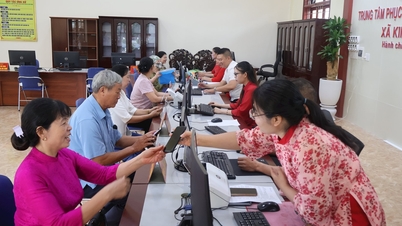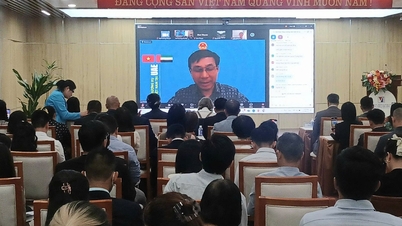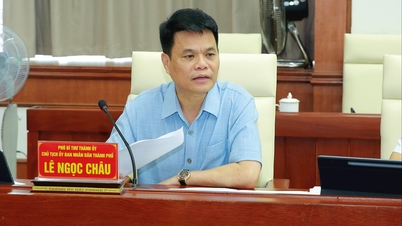
Maximum contribution level 1%
One of the new points of the revised Law on Employment is that the contribution rate to the Unemployment Insurance Fund is not fixed at 1% per month as currently, but is directed towards a maximum of 1%. Specifically, employees contribute 1% of their monthly salary, employers contribute a maximum of 1% of the monthly salary fund on the total number of employees participating in Unemployment Insurance (UI), and the state supports a maximum of 1% from the budget.
The Government will specify this content in detail to ensure flexibility in implementation. Because the maximum contribution regulation does not mean that employees and employers can freely choose the contribution rate, but this rate will be specifically regulated by the Government and applied to participating groups.
By the end of 2024, the Unemployment Insurance Fund will have a surplus of more than VND 64,300 billion, an average increase of 3% in the period 2022-2024. About 16 million workers participate in unemployment insurance and this number is expected to increase to 18.8 million by 2027. The increasing number of workers, increasing wages, leading to increased revenue and large surplus. Adjusting to a maximum of 1% is appropriate, contributing to coping with fluctuations in the labor market and unexpected situations such as natural disasters, pandemics, economic crises or when the Fund has a large surplus.
The amended Law also stipulates that in urgent situations such as crisis, economic recession, natural disaster, fire, war or dangerous epidemic, based on the actual situation and the balance of the Unemployment Insurance Fund, the Government shall prescribe a reduction in contribution levels, cash support or other support.
Expanding the coverage of social insurance
The new policy adds more groups to the list of participants in unemployment insurance to align with the revised Law on Social Insurance. Specifically, employees who have signed a contract for a full month or more instead of three months as currently, including cases where the two parties agree on a different name but the content shows the work with wages, salaries and management, operation and supervision by one party.
The expanded scope also applies to part-time workers whose monthly salary is equal to or higher than the lowest salary used as the basis for compulsory social insurance contributions; business managers, controllers, representatives of the enterprise's capital as prescribed by law; members of the Board of Directors, general directors, directors, members of the Board of Supervisors or controllers and other elected management positions of cooperatives and cooperative unions who receive salaries.
Depending on the period, based on the Government's proposal, the National Assembly Standing Committee decides on the participation in social insurance for other groups that are not yet subject to payment but have jobs and stable, regular income.
More specific regulations on salary as basis for social insurance contribution
According to the revised Law on Employment, for public sector workers, the salary used as the basis for monthly contributions is based on position, title, rank, grade, and position allowances, seniority beyond the framework, seniority, and salary retention differential coefficient (if any). For the private sector, the basis for contributions is the monthly salary, including the salary according to the job or title, salary allowances, and other additional payments agreed to be paid regularly and stably in each payment period. The more specific regulations are intended to be consistent with the revised Law on Social Insurance.
The highest base salary for contribution is 20 times the regional minimum monthly salary announced by the Government at the time of contribution.
If an employee is participating in social insurance and is detained or temporarily suspended from work, both parties will temporarily stop paying. In case the employee is entitled to full back pay, both parties will make up for the time of detention or temporary suspension. The Government will provide detailed regulations on this content.
Supplementing regulations on labor registration and database
The amended Law provides for labor registration and employee database, which are connected and synchronized with the National General Database, the National Population Database and other databases.
Labor registration information includes: Full name, personal identification number, date of birth, gender, ethnicity; current residence; education level including general education, vocational education, university education, vocational skills certificates and other certificates; employment status and needs; information groups on social insurance, unemployment insurance; characteristics and particularities of the registrant.
The database on workers is built and managed centrally and uniformly nationwide according to the provisions of the law on data. The Government will specify the records, procedures, places for labor registration, reception, connection, sharing and use of this database.
According to statistics, more than 60% of working-age people have not had their employment information collected, making it difficult to access and benefit from social policies. Previously, the drafting agency cited data that the whole country has 52.1 million workers, but only nearly 17.5 million people paying social insurance (SI) have information. The remaining more than 34 million people in the informal sector have not had their information collected and managed.
Reality has revealed many shortcomings, especially when disbursing support packages during the pandemic. Apart from the VND38,000 billion package from the Unemployment Insurance Fund, which was disbursed beyond expectations due to available information in the system, the disbursement rate of the remaining packages was very low due to lack of information.
In addition, the amended Law expands the scope of support for loans to work abroad under contracts; adds regulations on complaints and denunciations about unemployment insurance; adds some types of fees to the list...
The Unemployment Insurance policy has been implemented since 2009 with four main regimes: Unemployment benefits, job placement consultancy, vocational training support and health insurance. The fund is formed from contributions from employees, employers, the State budget and other legal sources. The participating group is formal sector workers, paid according to the principle of "contribute and receive".
By the end of 2024, more than 16 million people will participate in social insurance with estimated revenue reaching 23,700 billion VND.
HA (according to Vietnamnet)Source: https://baohaiduong.vn/chinh-sach-bao-hiem-that-nghiep-thay-doi-the-nao-tu-1-1-2026-414324.html



![[Photo] Prime Minister Pham Minh Chinh chairs the 14th meeting of the Steering Committee on IUU](https://vphoto.vietnam.vn/thumb/1200x675/vietnam/resource/IMAGE/2025/9/23/a5244e94b6dd49b3b52bbb92201c6986)


![[Photo] Editor-in-Chief of Nhan Dan Newspaper Le Quoc Minh received the working delegation of Pasaxon Newspaper](https://vphoto.vietnam.vn/thumb/1200x675/vietnam/resource/IMAGE/2025/9/23/da79369d8d2849318c3fe8e792f4ce16)
































































































Comment (0)